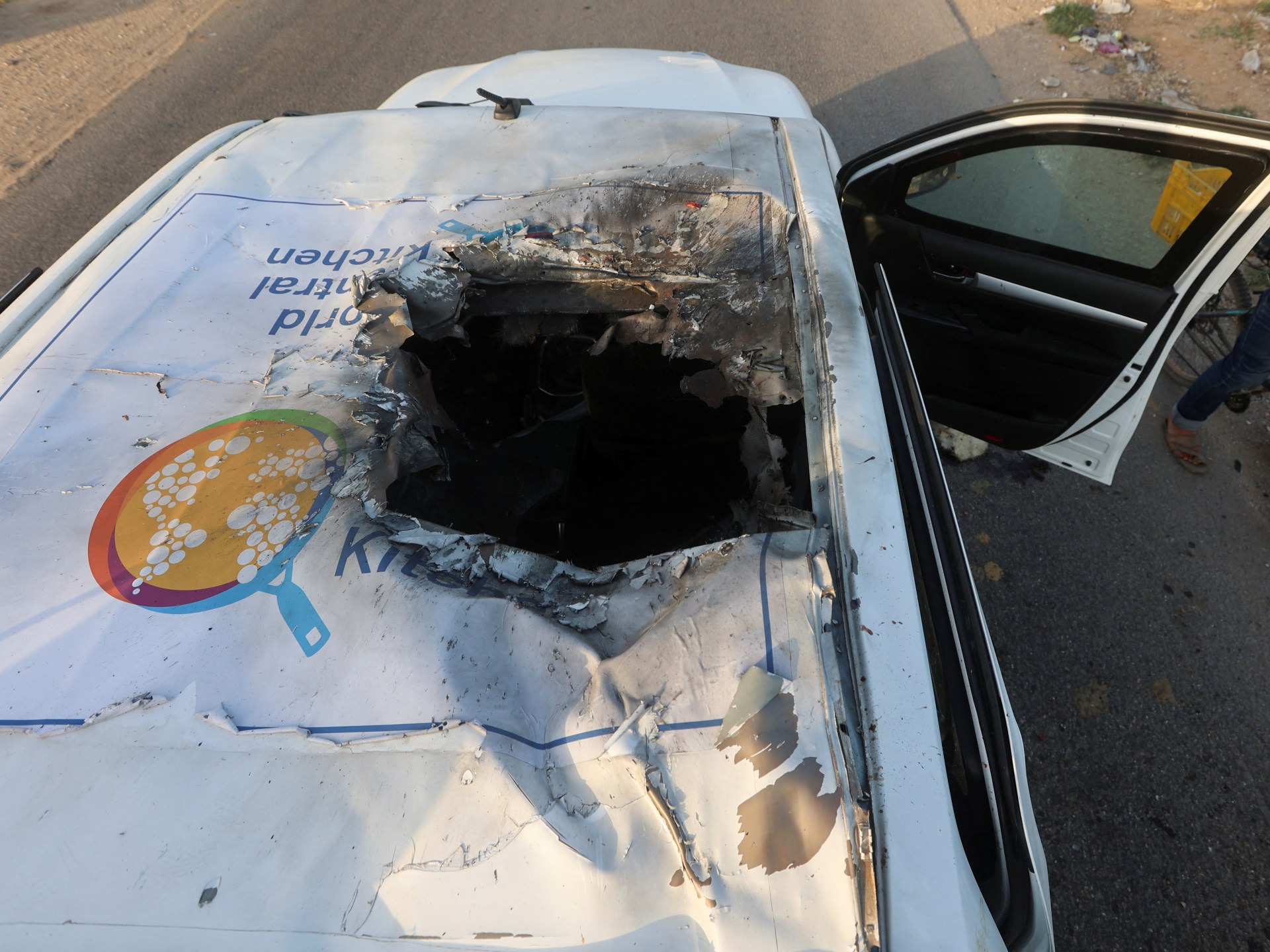A vehicle in a convoy belonging to the "World Central Kitchen" organization was targeted by the Israeli occupation and its members were killed in Gaza (Reuters)
International relief organizations said on Thursday that they could not do more to protect their employees in the Gaza Strip, and that the responsibility to avoid killing them falls on Israel, at a time when the United Nations is calling for direct humanitarian coordination with the Israeli army.
Global anger escalated over the humanitarian crisis in the Palestinian enclave, which has a population of 2.3 million people, after an Israeli air strike on Monday killed 7 people working for the US-based charity World Central Kitchen.
The United Nations says that at least 196 humanitarian workers have been killed so far in the six-month-old war.
While some relief organizations have commented, none have announced that they plan to withdraw from Gaza despite repeated attacks on relief efforts in the Strip, where the United Nations warns of an imminent famine.
Obstacles and obstacles
The United Nations has repeatedly complained of obstacles hindering the entry of aid into Gaza and its distribution throughout the Strip.
Scott Paul, Oxfam America's assistant director for peace and security, told reporters, "Every day we are forced to make a decision whether to suspend an operation or to proceed with an operation, and most often the decision is to suspend because the security conditions are not favorable."
The United Nations and international relief organizations operating in Gaza say that they inform the Israeli authorities of the locations of their headquarters and the movements they plan, and that they are in daily contact with them.
The United States said on Tuesday that it was "unacceptable and inexcusable" that the Israeli military's measures to avoid harm to aid workers were not working as they should.
UN spokesman Stephane Dujarric said on Thursday, "One of the things that might improve the system...is for us to have the ability to communicate more directly with the army instead of going through a number of levels of military-civilian coordination, as is the case now."
The Israeli Ministry of Defense said on Tuesday that it would work to strengthen coordination, including by opening a joint room for coordination between the Israeli army's Southern Command and international relief organizations.
The matter falls on “Israel’s responsibility”
Israel also stated on Thursday that it would modify the methods it uses in its war.
“The rules of war require that combatants always know the difference between military objectives and humanitarian relief personnel,” said Bushra Al-Khalidi, policy advisor at Oxfam.
"If there was any doubt, it is Israel's responsibility to avoid harming us," she continued, adding that aid organizations make their staff as visible as possible in an attempt to protect them.
Celebrity chef José Andrés, who founded the World Central Kitchen, told Reuters that Israel targeted the organization's aid workers "systematically, one vehicle after another."
Israeli government spokeswoman Rakela Karamson responded on Thursday, saying, “This was unintentional.”
Louise Pichet, head of the Middle East department at Médecins du Monde, said the organization's offices in Gaza City were partially destroyed, "even though we clearly sent our GPS coordinates and the Israeli army knew them well."
She added, "This shows the failure of the deconfliction process and raises a serious question... (about) the State of Israel's understanding of and respect for international humanitarian law."
The United Nations Relief and Works Agency for Palestine Refugees (UNRWA), which UN Secretary-General Antonio Guterres described as the backbone of the humanitarian response in Gaza, said that its facilities were subjected to more than 300 raids and 177 employees were killed.
UNRWA stated that it had provided the coordinates of all its facilities in Gaza to all parties to the conflict, and added that several convoys transporting aid to northern Gaza were also targeted, despite detailed coordination with the Israeli army.
Isabelle Defourny, head of Doctors Without Borders in France, said the humanitarian coordination system was not working, and she could not imagine a way to improve it while there was a "lack of proportionality" in how Israel waged the war.
She continued, "They know where we are, what we are doing, and where we will work. Despite this, security incidents occur."
Source: Reuters

